Suspected Israeli Strike Hits Syrian Air Base Used By Iran
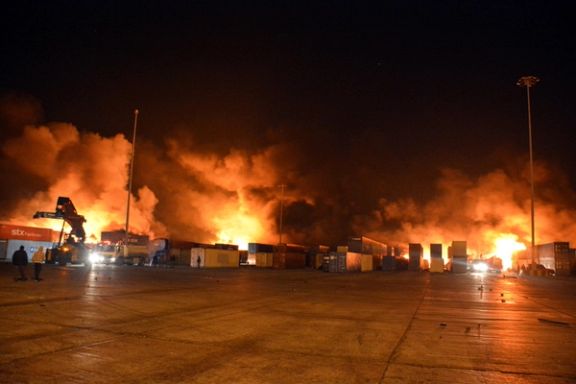
Israeli missiles hit a major air base in Syria's Homs province Sunday, killing two servicemen and injuring three others, the state news agency SANA reported.

Israeli missiles hit a major air base in Syria's Homs province Sunday, killing two servicemen and injuring three others, the state news agency SANA reported.
Military sources said the air base, at Shayrat, was recently used by the Iranian air force.
Syrian state media posted a short video of the "aggression" and said there were material damages, without elaborating.
One military source, who was not authorized to speak publicly, said the strikes had targeted a runway in the sprawling air base that is located southeast of Homs city.
A spokesperson for the Israeli military refused to comment, although Israel has conducted hundreds of similar strikes since 2017.
The runway and underground facilities at Shayrat, including aircraft shelters, have undergone a major expansion by the Russian military in the last three years, the military source said.
Russia has forces stationed near to Shayrat air base and uses the base, security sources say.
Israel has in recent months intensified strikes on Syrian airports and air bases to disrupt Iran's increasing use of aerial supply lines to deliver arms to allies in Syria and Lebanon including Lebanon's Hezbollah.
The UK-based Syrian Observatory for Human Rights which monitors such events said a warehouse for Iranian militias and Hezbollah in Shayrat air base were destroyed in Sunday's strike.
Opposition sources say Iranian militias hold sway in large swathes of western Homs province near the Lebanese border and to the east where they have a string of bases.
Israel has been mounting attacks in Syria for years against what it has described as Iranian and Iran-backed forces that have deployed there during the war, which began more than a decade ago.
With reporting by Reuters
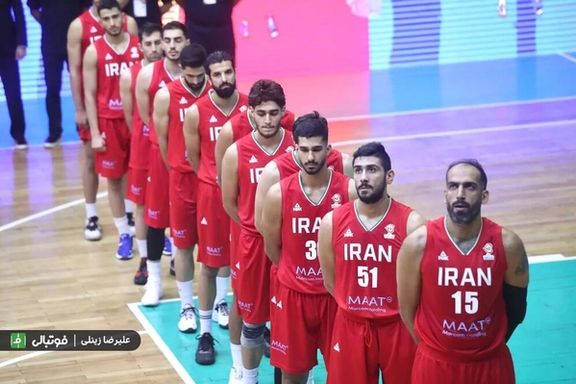
While Iran’s football team is about to embark on its World Cup journey in Qatar, the Islamic Republic is worried that the event serves as an opportunity for antigovernment protests.
Since the current wave of demonstrations began in mid-September, following the death in custody of a young woman, more and more athletes have expressed solidarity with the people either in bold public statements or through different forms of disobedience, such as not singing the Islamic Republic’s national anthem during matches.
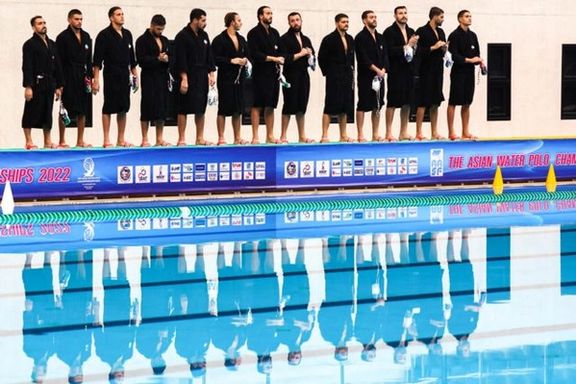
In less than a month, the pace of the athletes showing support for the protests has accelerated as the Iranian football, beach football, waterpolo, basketball, and sitting volleyball teams refused to sing along with the anthem, which is customary in almost all international competitions. Now with the biggest sporting event on the horizon, the regime is resorting to whatever it can to stifle the voices of dissent.
Authorities have made serious threats against athletes and other celebrities to stop them from public displays of solidarity with protesters but to no avail.
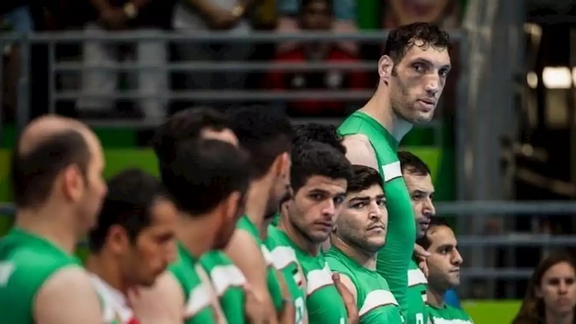
Threatening to remove players from the national squad, Ahmad Rastineh, the spokesman of the parliament’s cultural committee, said on Sunday that "if a player does not have a proper understanding” of the current affairs, it is not necessary to keep them in the national outfit.
Earlier in the month, the beach football federation of the Islamic Republic threatened the players of the national squad for their acts of solidarity with the antigovernment protests.
The national team players did not cheer or celebrate after winning the cup following their final victory against Brazil and also refused to sing the national anthem of the Islamic Republic at the beginning of their semifinal match against the UAE.
During the final, Iranian striker Saeed Piramoun expressed his solidarity with Iranian protesters by miming the hair cutting gesture after scoring a goal. The gesture has become an international symbol of solidarity with Iranian women and the protest movement with many international athletes and celebrities posting images of themselves re-enacting the move. Islamic Republic officials also issued a threatening message to the United Arab Emirates that hosted the Beach Soccer Intercontinental Cup.
A new trending act of solidarity that is catching on in the past several days, is the reenactment of a photo of one the protesters killed by security forces in the Baluch-majority province of Sistan and Baluchestan.
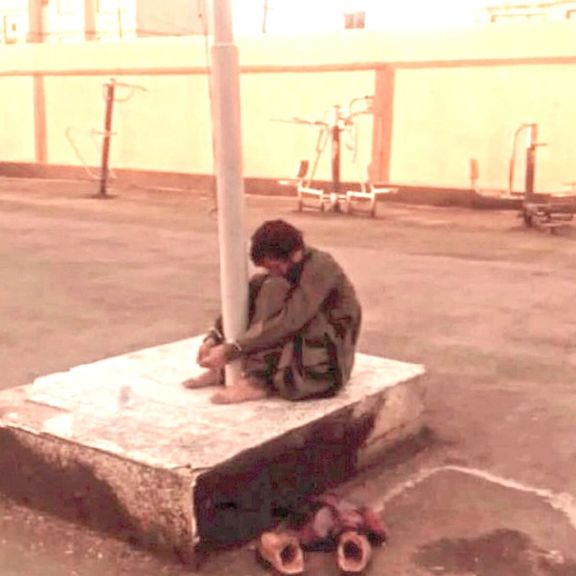
The iconic photo, which is from an earlier event, shows Khodayar Lojei handcuffed to a post while a glass of water is placed near him but with a distance he cannot reach. Several football and futsal players sat in the same position instead of cheering after scoring a goal while another player put a symbolic glass of water near them.
Also on Sunday, Andrea Stramaccioni, the former Italian coach of the popular football club Esteqlal, said in an Instagram story that he was approached by many Iranian state TV sport programs to appear in their shows as a guest during the World Cup, noting that he rejected the offers because the state broadcaster is suppressing the voice of people.
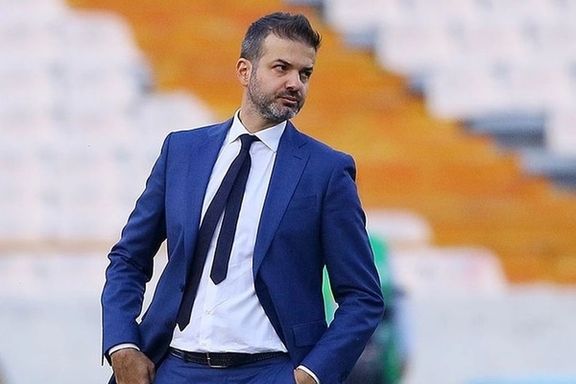
Addressing the Iranians, he said, “My heart is with you and refusing participation in programs and television you don’t approve of is the least I can do to support your brave movement. Do not lose your hope because the Iranian people we saw deserve a lot more than what they already have.”
During a press conference after the Iranian basketball team’s match with the Chinese squad, several journalists walked out as a show of solidarity with their peers arrested for reporting on Islamic Republic’s deadly violence against protesters.
"Our colleagues have been arrested for some time and are now in prison. We cannot [continue our work] until they are released... We have decided to leave this place. We are not spies or criminals. We are journalists. We are only journalists; sport journalists," said one of the reporters before leaving the room.

Paris says the number of French nationals detained by the Islamic Republic of Iran has reached seven with the arrest of two more citizens.
French Foreign Minister Catherine Colonna said on Saturday that Paris is concerned over the incarceration of two other citizens urging Tehran to immediately release them and provide them with consular protection.
Colonna made the comments in an interview with Le Parisien newspaper about the new development, which would seemingly bring about a further deterioration in mutual relations.
She reminded the Islamic Republic of its international obligations warning the if the goal behind the detention is to blackmail France, “then it cannot work.”
Human rights organizations accuse Iran of a systematic policy of hostage taking over four decades from the earliest period of the Islamic republic after the ouster of the Shah, starting with the 1979-1981 siege at the US embassy in Tehran.
Tehran denies any policy of hostage taking and insists all foreigners are arrested and tried according to legal process. However, it has frequently shown readiness for prisoner exchanges and participated in swaps in the past.
Most trials of political cases, including detained Western detainees are without due process of law and based on trumped up charges.
In her interview, Colonna however noted that her Iranian counterpart Hossein Amir-Abdollahian “has committed to respect the prisoners’ right of access.”
Her comments come a day after French President Emmanuel Macron expressed solidarity with Iranian freedom-seeking protesters calling their movement a “revolution”.
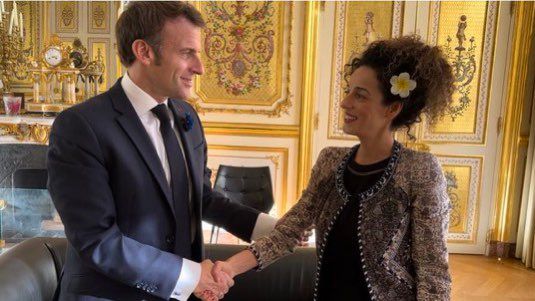
In early October, France accused the Iranian regime of “dictatorial practices” after Iran’s state TV aired the forced confessions of two French nationals arrested in the Middle Eastern country ruled by its 83-year-old anti-West ruler, Ali Khamenei.
In the video of the forced confessions, one of the two French nationals - Cecile Kohler - said they were in Iran to “prepare the ground for the revolution and the overthrow of the regime of Islamic Iran.”
Iran’s state media are infamous for purported confessions by prisoners in politically charged cases. Such prisoners are held without due process of law and usually cannot choose their own defense attorney.
On Friday, Le Figaro newspaper reported that the two nationals had been arrested prior to the start of anti-government protests in September over the death of 22-year-old Mahsa Amini.
Ties between France and Iran have soured recently as efforts to revive 2015 nuclear talks in which Paris is one of the parties have come to a standstill.
Following the uprising against their authoritarian government after killing of Amini in police custody, the EU imposed new sanctions on Iran following similar measures by the United States, Canada and Britain.
A new round of European Union sanctions for human rights violations by Tehran will also be approved at a foreign ministers' meeting on Monday, two diplomats told Reuters.
The sanctions are set to target 31 individuals and entities and would freeze their assets and imposing travel bans.
“France has also proposed new designations for those who would sell drones to Iran and to sanction people involved in the export of electronic components for drones,” one of the diplomats said.
The identity of the two new French detainees was not immediately clear, but Cecile Kohler and Jacques Paris, whose confessions earlier aired on the Iranian TV, have been arbitrarily detained since May 2022.
Fariba Adelkhah, is another Iranian-born woman, who was arrested in 2019 and sentenced to five years in prison for “undermining national security.” Benjamin Briere was similarly arrested in May 2020 and sentenced to eight years and eight months for espionage, without due process of law.
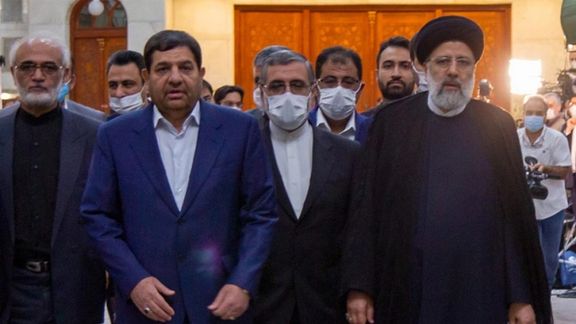
Iran faces a serious shortage in medicines with some prices rising sevenfold, months after the government eliminated cheap dollars for importing raw materials.
The crisis in health care is just one aspect of the overall economic crisis, precipitated by a centralized and often mismanaged economy, and for the past years, US sanctions.
Most medicines in Iran are produced locally by quasi-governmental companies that import the raw material from other countries. When the Iranian currency began to lose value in early 2018, the government offered a fixed exchange rate for essential goods, mainly food and medicines. However, earlier this year, the new administration of President Ebrahim Raisi eliminated what was in fact a government subsidy. Now, food and medicine producers must buy dollars at rates seven times higher to import their raw materials, which has disrupted production.
Deputy chairman of pharmaceuticals producers, Ali Fatemi told Aftab News in Tehran that when an economic sector is controlled by the government and is managed according to “a command economy” it is not surprising that a situation like the current shortage would emerge. The government sets unreasonably low prices and then stops subsidies, which makes it impossible for its companies to but raw materials and produce, he said.
To partially alleviate the shortage, the Iranian government allows medicines, such as antibiotics and simple cough syrups to be imported from India, Fatemi explained, and as a result the country spends much more foreign currency, instead of importing the raw materials.
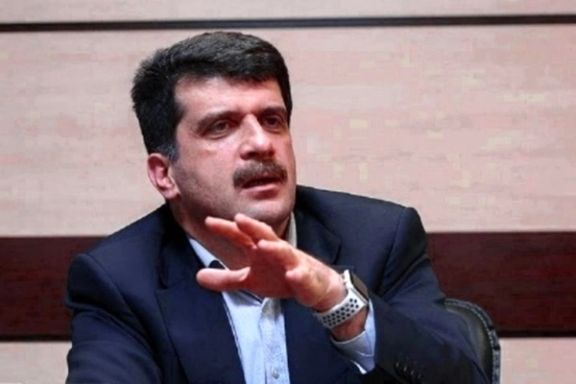
Apart from pharmaceuticals, inflationary recession has gripped other sectors, according to Fararu website in Tehran. As prices have risen at least by 40 percent for two consecutive years, consumers have lost their purchasing power and demand has fallen. This has led to a “domino effect for producers and factories” that must stop operations. This in turn creates more unemployment and less consumer demand.
Iran’s currency has fallen by more than 15 percent since early September when it became clear that a nuclear agreement with West was not a realistic expectation.
Since early 2018, when the United States signaled its intention to withdraw from the 2015 nuclear deal known as the JCPOA, Iran’s rial has fallen tenfold from 35,000 to the dollar to 350,000 on November 12. When the US did withdraw from the accord in May of that year, it imposed damaging oil and banking sanction on Iran. This further devalued the rial and led to very high inflation, which coupled with the inefficiencies of a government-controlled economy, has impoverished tens of millions of people.
Ehsan Soltani, an economist in Iran told the website that while food prices have risen eightfold since 2018, wages, at most, have increased threefold.
“In recent years with rising inflation, economists warned officials about ‘inflationary recession’, but the government did not pay attention at all,” Soltani explained.
In fact, from cautious statements by many officials, especially in the previous Iranian government headed by President Hassan Rouhani, it was apparent that they were aware of the dire situation, but they had no control over the country’s foreign policy, which had brough about crippling US sanctions.
But Iran’s 83-year-old anti-Western ruler, Ali Khamenei, has the last word on foreign policy and only he could allow a new nuclear deal to be signed that would lift the most damaging sanctions.
Iran’s economic growth in the past decade has been zero and Soltani compared Iran to its neighbor Turkey. “Just look at Turkey…and see the high rate of growth it has achieved in the past ten years, adding tremendously to its foreign currency revenues, while we have faced economic and infrastructure decay.”
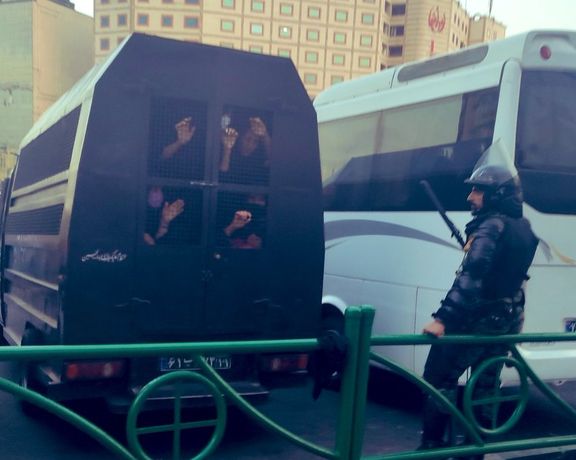
A network of activists with a mandate to follow up on the condition of detained protesters in Iran has reported dire human rights violations such as torture and sexual abuse.
The “Volunteer Committee to Follow-Up on the Situation of Detainees” reported torture, sexual harassment, threats of rape, not having access to medical services, and the detention of some detainees in secret locations.
The committee announced that it was able to identify over 1,600 prisoners, including 65 minors.
“These prisoners include 969 ordinary citizens, 393 students, 145 civil activists, 42 journalists, 40 political activists, 38 women's rights activists and 26 attorneys.”
According to this committee, some others have been threatened with arrest and harassment of their family members.
“A female prisoner has been openly threatened with rape. The interrogators told her and other detainees “If you are raped here, you cannot protest! Your want to get naked, and you must pay for it!” The government and its agents accuse anti-hijab protesters of improper attire and nudity.
Another detainee has told activists that some protest prisoners are kept with criminals, and they have been sexually abused by them.
According to this report, some injured people who have dozens of shotgun pellets in their bodies were left unattended.
At least 14,000 people have been arrested during the recent protests. However, Kazem Gharibabadi, secretary of Iran's High Council for Human Rights denied the arrest of so many people but did not provide any official information about the number of detainees.
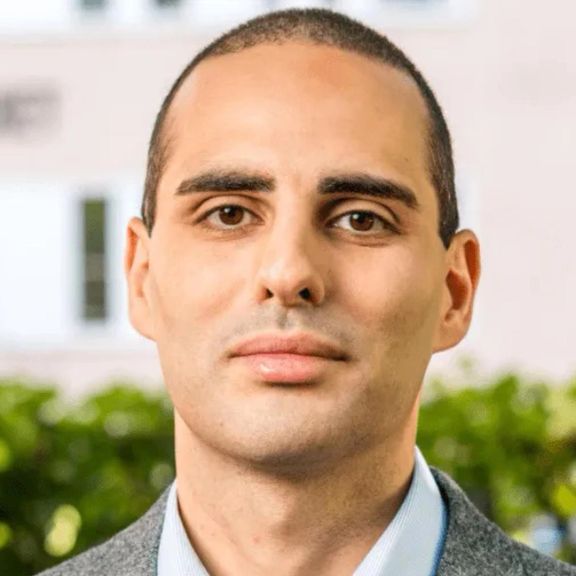
Sweden says two Iranian-born brothers and citizens of the country have been charged with spying for Russia and its military intelligence for about a decade.
Swedish authorities have identified the two as, Peyman Kia, 42 and Payam Kia 35. One of these two brothers has also been indicted for alleged gross unauthorized handling of secret information.
Reportedly the older brother has been working with Sweden's Domestic Intelligence Agency for years.
“It has been a complex investigation concerning a crime that is very difficult to investigate and the suspicion concerns very serious criminality directed against Sweden's intelligence and security system," National Security Unit chief prosecutor Per Lindqvist said.
He noted that this case is about confidential and very sensitive information but refused to give further explanation.
According to the charge sheet obtained by AP, these two brothers have provided information to the Russian Military Intelligence Department (GRU) between September 28, 2011 and September 20, 2021.
It adds that Peyman Kia, obtained this information from various security and intelligence institutions of Sweden when he was working at Sweden's Domestic Intelligence Agency and the Swedish Armed Forces. The other brother also helped to make contact with “Russia and the GRU including matters of surrender of information and receipt of compensation.”
They were arrested in September and November 2021. Both have denied any wrongdoing, Swedish media reported. The brothers face up to life imprisonment if convicted. A life sentence in Sweden generally means a minimum of 20-25 years in prison.